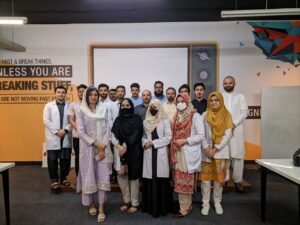Nutrients are substances found in food that are necessary for the maintenance of life, growth, and health. They can be classified into six categories: carbohydrates, proteins, fats, vitamins, minerals, and water.
- Carbohydrates are the body’s primary source of energy and can be found in foods like bread, pasta, and fruits.
- Proteins are essential for the growth and repair of body tissues and can be found in foods like meat, fish, eggs, and beans.
- Fats provide the body with energy, insulation, and protection, and can be found in foods like oils, butter, and nuts.
- Vitamins and minerals are essential for various bodily functions, such as building strong bones, regulating metabolism, and maintaining a healthy immune system. They can be found in foods like fruits, vegetables, dairy products, and meats.
- Water is also a crucial nutrient that is necessary for hydration, digestion, and regulating body temperature.
Importance of nutrition for health
Nutrition plays a crucial role in maintaining good health and preventing chronic diseases. Good nutrition is important for several reasons, including:
Energy
Nutrition plays a crucial role in maintaining good health and preventing chronic diseases. Good nutrition is important for several reasons, including:
Growth and Development
Nutrients like proteins, vitamins, and minerals are essential for growth and development. They are particularly important during childhood and adolescence when the body is growing rapidly.
Immune function
Nutrients like vitamins A, C, and E, zinc, and selenium are essential for maintaining a healthy immune system. A healthy immune system helps the body fight off infections and diseases.
Disease prevention
A healthy diet that includes a variety of fruits, vegetables, whole grains, lean proteins, and healthy fats can help reduce the risk of chronic diseases like heart disease, diabetes, and some types of cancer.
Mental health
Research has shown that good nutrition is important for mental health. Nutrients like omega-3 fatty acids, B vitamins, and vitamin D have been shown to have a positive impact on mental health.
Essential nutrients that are beneficial for health
There are several essential nutrients that are beneficial for health. These include:
Protein
Proteins are essential for the growth and repair of tissues, and are particularly important for building and maintaining muscle mass. Good sources of protein include lean meats, fish, eggs, dairy products, beans, and legumes.
Omega-3 fatty acids
Omega-3 fatty acids are essential fats that have been shown to have numerous health benefits, including reducing inflammation and lowering the risk of heart disease. Good sources of omega-3 fatty acids include fatty fish like salmon, mackerel, and sardines, as well as walnuts and flaxseeds.
Fiber
Fiber is important for maintaining digestive health and reducing the risk of chronic diseases like heart disease and diabetes. Good sources of fiber include fruits, vegetables, whole grains, beans, and legumes.
Calcium
Calcium is essential for building and maintaining strong bones and teeth. Good sources of calcium include dairy products like milk, cheese, and yogurt, as well as leafy green vegetables, tofu, and fortified foods.
Vitamin D
Vitamin D is important for bone health and immune function. The body can produce vitamin D when exposed to sunlight, but it can also be found in foods like fatty fish, egg yolks, and fortified foods.
Iron
Iron is essential for the production of hemoglobin, which carries oxygen in the blood. Good sources of iron include red meat, poultry, seafood, beans, and fortified cereals.
Mental health
Research has shown that good nutrition is important for mental health. Nutrients like omega-3 fatty acids, B vitamins, and vitamin D have been shown to have a positive impact on mental health.
Ramadan
Fasting during Ramadan is an important religious practice, but it is also important to maintain a healthy and balanced diet to ensure that the body is receiving the necessary nutrients to maintain energy levels and support overall health. To make the most out of the fasting period during Ramadan, it is recommended to eat foods that are rich in nutrients and provide sustained energy throughout the day. Foods that are high in fiber, protein, and complex carbohydrates are ideal, as they help to keep the body feeling full for longer periods of time and provide the necessary energy for daily activities.
In this blog, we will discuss tips for maintaining a healthy and balanced diet during Ramadan.
Eat a Balanced Pre-Dawn Meal
The pre-dawn meal, also known as suhoor, is important as it provides the necessary energy to sustain the body throughout the day. It is recommended to eat a balanced meal that includes complex carbohydrates, protein, and healthy fats, as these foods are digested slowly and provide sustained energy. Examples of good suhoor foods include oatmeal, whole wheat toast with avocado, and eggs.
Stay Hydrated
It is important to drink plenty of water and fluids during the non-fasting hours to prevent dehydration. Avoid sugary drinks and caffeinated beverages, as these can lead to dehydration. Drinking water throughout the night can also help to prevent dehydration during the day.
Break the Fast with a Light Meal
It is recommended to break the fast with a light meal, such as dates and water, before moving on to a larger meal. This helps to prepare the digestive system and prevent overeating. Overeating during the non-fasting hours can lead to digestive issues and decreased energy levels during the day.
Exercise regularly
Regular exercise can help to maintain muscle mass and support overall health during Ramadan. It is important to exercise during the non-fasting hours, and to avoid intense exercise during the hottest parts of the day
Eat a Variety of Nutrient-Dense Foods:
To maintain a healthy and balanced diet during Ramadan, it is important to eat a variety of nutrient-dense foods, including fruits, vegetables, whole grains, lean protein, and healthy fats. These foods provide the necessary vitamins, minerals, and nutrients to support overall health and well-being.
Avoid fried and processed foods
Fried and processed foods are high in calories, fat, and sodium, and can lead to weight gain and other health issues. Instead, choose grilled or baked foods, and limit the intake of processed and packaged foods.











